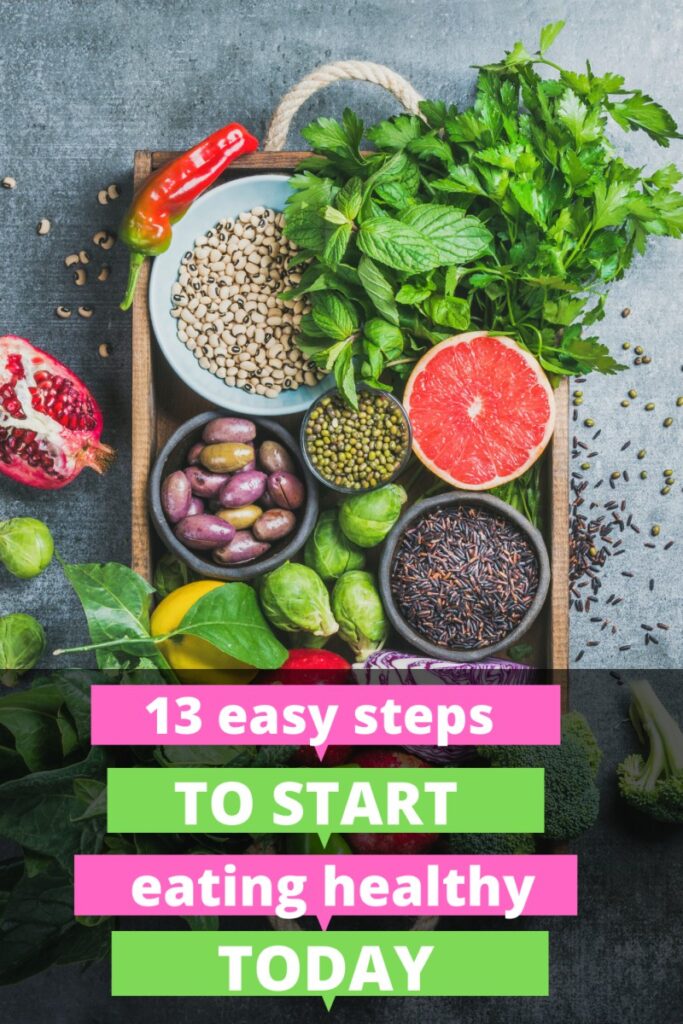Eating healthy doesn’t have to be complicated.
I am not a big fan of spending countless hours in the kitchen day by day – most of my meals are ready under 1/2 hour.
The most important is to teach your brain to get out of the repeated comfort zone.
Your brain will always do what has been conditioned to do. Your brain loves comfort.
Once you start introducing different habits and stick to them, acting from a happy place in the future rather than the past, you can achieve anything.
You can learn how to eat healthily – you have to look at this as a continuous lifestyle choice for the body & brain you want to have in the future.
Remember, that temporary pleasures serve you only temporarily.
What you need is to believe in yourself. You don’t need permission from anyone to believe in yourself, and you don’t need any evidence from your past neither.
Decide what you want and stick to it. Keep working towards it. Despite countless obstacles.
I offer you to don’t be afraid to stay with your emotions. Be bold enough to keep a food journal to track how certain foods make you feel.
When you realise that the temporary pleasure of eating a doughnut gives you a hateful emotion the very next day, you then have a choice to choose whether you will eat that doughnut next time.
Your brain is powerful. Only you can control it. You control your decisions – no one else has that power over you.
You have to get to know yourself and be comfortable with whatever emotion comes your way. Because emotions don’t hurt. They just are.
And so when you feel sad, depressed, angry… know, that it’s ok to have that emotion. You don’t have to mask or hide the emotion behind the unhealthy foods that only offer you temporary satisfaction.
Decide on purpose to feel better, lighter, healthier.
Plan ahead. Write down foods you will eat the very next day, and stick to that plan. Do not eat anything else. Nothing that is not on your list.
Focus your attention to the sensation of hunger. Eat when you feel hungry. The sensation of being hungry is so unknown in today’s society.
Keep your meals simple. Overcomplicated recipes can make you feel overwhelmed. It’s ok to eat the same foods couple of days in the row.
You have all it takes to make yourself healthier, to supply your body with nutritious food that will nourish your body and brain. Mother Nature offers us foods that are simple.
Forget the supermarket’s prepackaged foods full of artificial ingredients, and learn how to prepare your own food. Do it for yourself => SELFLOVE.
Back to the roots. When choosing the foods to buy, ask yourself whether your grand-grandparents would buy it? Most likely not, as they wouldn’t recognise it as a food if it’s packaged and contain plenty of ingredients…
13 simple ways to start eating healthy today:
1. Buy more whole foods
– meaning whole fruits and vegetables, nuts, seeds, rice, lentils, beans, herbs – not the frozen pureed products, not the canned vegetables and soups and premade meals. Deliberately choose to skip the boxed and packaged products with more than 5 ingredients on the list. By all means, I do not think that all packaged foods are evil, however, choose foods you trust and use common sense.
2. Read the labels
– I know, reading labels can be so confusing! Let’s make it easy: When reading the label on a particular product, focus on ingredients. The general rule of thumb is 5 or less on the ingredient list. Make sure you understand most of the ingredients. Avoid a list of ingredients you can’t pronounce, which are mostly preservatives, additives and chemicals, that are far from nourishing your body.
Stay away from foods that contain natural flavourings, and also avoid the foods with any type of ‘E’s.
3. Be aware of hidden sugar
– sugar is 8x more addictive than cocaine. That says it all. No wonder so many of us find it extremely difficult to stay away from it, and when trying to clean out our diet, sugar cravings are the real deal! Sugar made its way to literally most of the manmade foods these days. Hidden under words like fructose, sucrose, dextrose, cane sugar, glucose syrup, golden syrup, barley malt, high-fructose corn syrup, invert sugar, dextrin, maltodextrin, agave syrup – just to name a few that are used the most often (at least based on my own experience)
4. Be curious about the source of your produce
– meat, fish, dairy, fruits and vegetables. Where does the produce come from? How was the stock treated? Is it grass-fed, or corn and grain-fed? Are the fruits and vegetables heavily sprayed with pesticides, fungicides, and other chemicals? Get back to the roots – meaning support local farmers whenever possible, choose foods from ethically-raised animals. Buy local and seasonal fruits and vegetables whenever you can.
5. Eat less man-made carbohydrates
That’s right, less of the pasta, pizza, pretzels, doughnuts, pastries, cookies… (if any at all). Carbohydrates lead to weight gain, feed the bad bacteria and candida, and spike insulin. Reach for natural sources like rice, quality sourdough (please, just forget the ‘see-through’ toast bread), try ancient grains like millet, split, Kamut, bulgur and amaranth. Experiment. Different flavours will only enrich your experience.
6. Replace the ordinary table salt for a quality high-mineral salt.
Let it be a good sea-salt or Himalayan salt, Maldon sea salt flakes, or any of your favourite brands. Anything is better than the refined table salt. I love Celtic sea-salt, and I have recently purchased Arctic Sea salt from a company called
Na’Vi Organics.You can also try include more herbs and spices to flavour your dishes.
7. Drink more pure water
– if you don’t drink any water, then it’s definitely the right time to start.
Water is such an overlooked topic – I often hear my clients say: but I don’t like the taste of water! There is nothing to like or dislike here, water doesn’t have a taste and your body is made out of the water, so drink up! Please, note, when your brain is thirsty, it takes water from your internal organs, and when there is no water, your brain literally shrinks! How can we think clearly and make good decisions then?
Infuse your water with sliced fruit, or add a slice of a cucumber and some herbs like mint and basil if you like. Anything else then water has to pass through your liver, so nothing else really equals this precious tasteless liquid. Drink up!
8. Eat less of dairy products
– if you must have your cheese, reach for unpasteurised cow’s milk, or even better, ewe’s cheese (Manchego), or Halloumi is a good and much healthier option. And if you truly must have the cow’s cheese, make sure you know the source (preferably from grass-fed cows).
9. Add vegetables and leafy greens to your meals
– leafy vegetables are easily blended into the smoothies, and if you are not a smoothie gal, then investing in a good source of
organic green powder that you can simply mix in a glass of water, tea or a juice (even a soup will do) is a great way to go. This way you will
make sure your body has got the necessary nutrients and don’t need to worry about eating your salad every day.
– there is literally a rainbow of vegetables, so if you are new to eating vegetables just pick one new veggie a week, and try it out. You don’t need to make fancy recipes, try it raw, or simply steam, or stir-fry and you are good to go.
10. Avoid margarine and vegetable oils
– they might’ve got a tremendously great advert campaign a few years ago (I hope now it’s not the case), any many people truly believed to the misleading information of the presented so-called health benefits.
Margarine and vegetable oils are highly processed and are simply a no-no if you want to eat healthy. Choose unpasteurised butter instead if you must, or cook with lard as our grandparents did. Avocado oil and coconut oil are great to use for cooking, as they are stable at high temperatures.
11. Be mindful and stay true to your emotions
– as mentioned at the beginning of this article, focus on your emotions every time when you reach out for the food. Check-in with yourself whether you are genuinely hungry (focus on the sensation in your belly), or is there any other emotion present?
We have lost the connection with our bodies and mind. It’s the time to re-learn, to dive deeper and reconnect with ourselves, in order to make better choices for our healthier and happier future.
It’s hard, but it’s not impossible. When you fell off the track, continue anyway. Strive for progress, not perfection. Practice makes Master.
12. Plan your meals
– planning your meals helps you to stay on track with your healthy eating. Write down what are your meals going to be the next day (you can even do a whole week plan), and stick to it. Do not eat anything else what’s not written down in your planner.
This way you will avoid eating unhealthy foods when you suddenly feeling emotionally stressed. Instead, you can connect to your true self, and stay with the particular emotion. Emotions need to be processed, not to be covered with junk food.
13. Keep your meals simple
– keeping your meals simple helps to avoid the overwhelming feeling of constantly looking for new recipes. Food is here to nourish you, not to make you exhausted. If you are new to healthy eating, try to pick one new easy recipe a week, and learn how to prepare it. In no time you will create your own collection of a few favourite ones you can easily stick to.
For example, I am all about vegetable and lentil curries and stews during the colder months – the recipes are always the same, I only rotate the vegetables from time to time depending what’s in season. Summer calls for many smoothies and salads, an occasional soup. I eat eggs all year round, and I always rotate only 3 recipes, because they are my favourite ones.
All in all, my meals are simple, tasty, but most importantly they are NOURISHING and NUTRITIOUS.
Let me know in comments below, what do you struggle the most with, when it comes to healthy eating.
And now drink your smoothie and get some sunshine ☀️




0 Comments